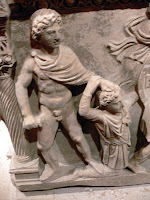This review of Frank Joseph's The Lost Worlds of Ancient America made some pretty startling (to me) claims about Minoan civilization:
"Each palace had bathrooms with flush toilets. The rooms also had heat and running water suggesting that the Minoans had a considerable civil engineering capability. They understood water flow, elementary thermodynamics and heat transfer."The claims about heat and running water are pretty decently supported, if I understand correctly. But this was the first time I had heard about the toilets! I took a few minutes to research this claim with the tools at hand (the Oxford Classical Dictionary and Google Books). As a result, I have a new perspective on my own research as seriously lacking in unintentional hilarity. Take this subheading from what I am sure is a very fine archeological report from Israel:
"The Toilets Excavated By Woolley
The number of well-preserved bathrooms and restrooms found at Tell Atchana is extraordinary in comparison to that found at any other Middle or Late Bronze Age Levantine site...."A footnote mentions a dispute as to whether the seat of a Minoan toilet was a true seat or a "squatting board". In all seriousness, I know someone has to study the history of toilets. I often experience a sincere envy towards those who study the really practical aspects of ancient life (as opposed to my own field, which is something like "guessing what ancient poets were thinking, what they thought the audience was thinking, and what they audience thought that the poet thought they were thinking.")
Basically, it seems that although some dispute the presence of toilets at Minoan palaces, most accept their existence. They appear to have resembled the outdoor latrines you often see in Roman archeological sites (only with fewer seats, one assumes) and used stone drains.
image credit Pin It





